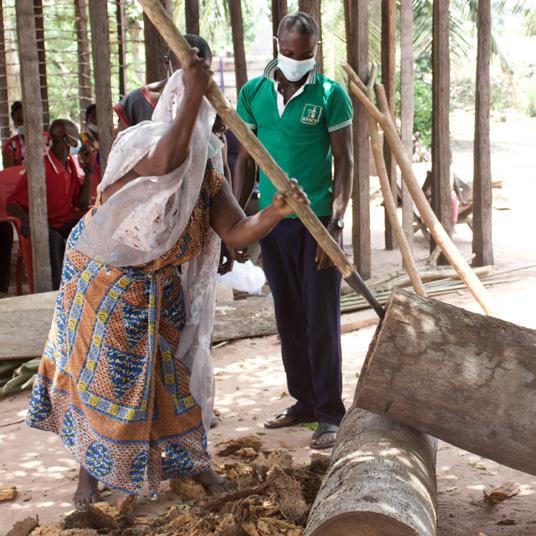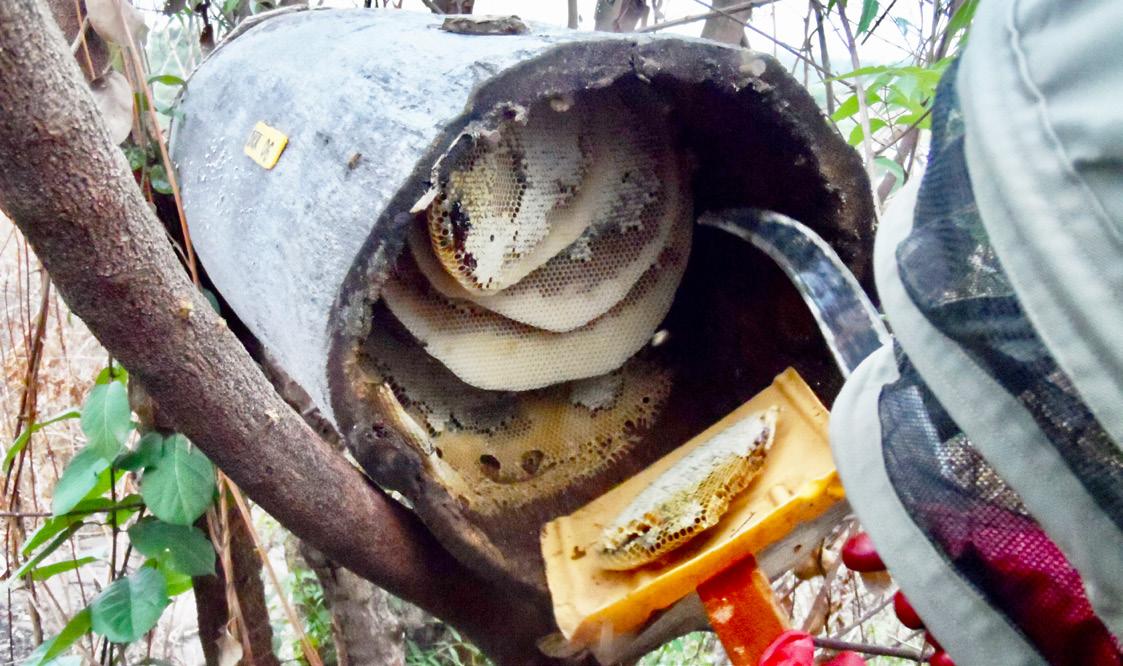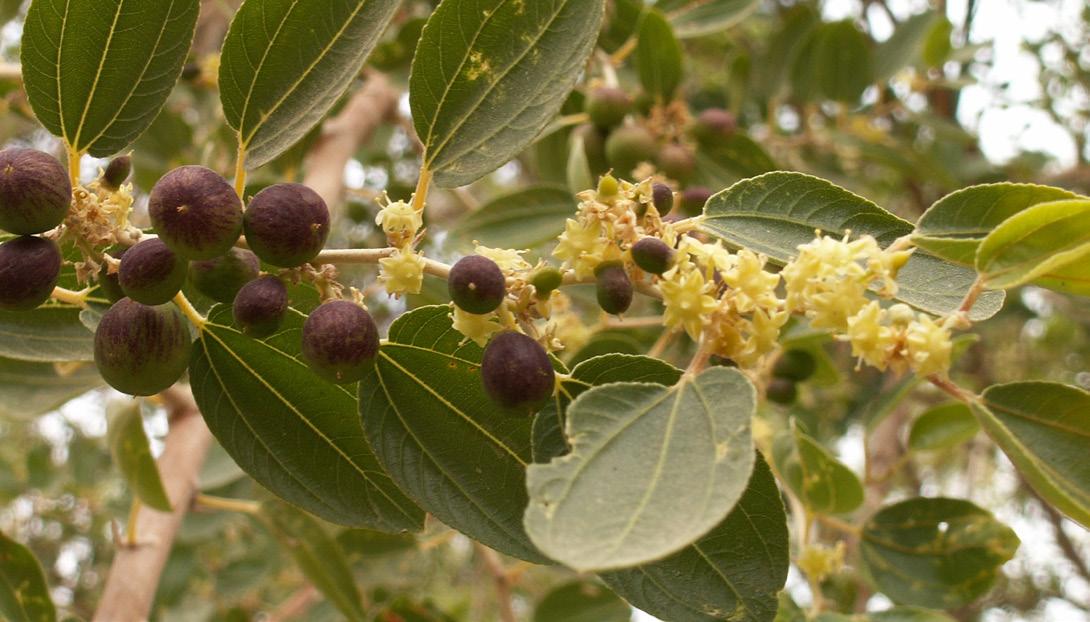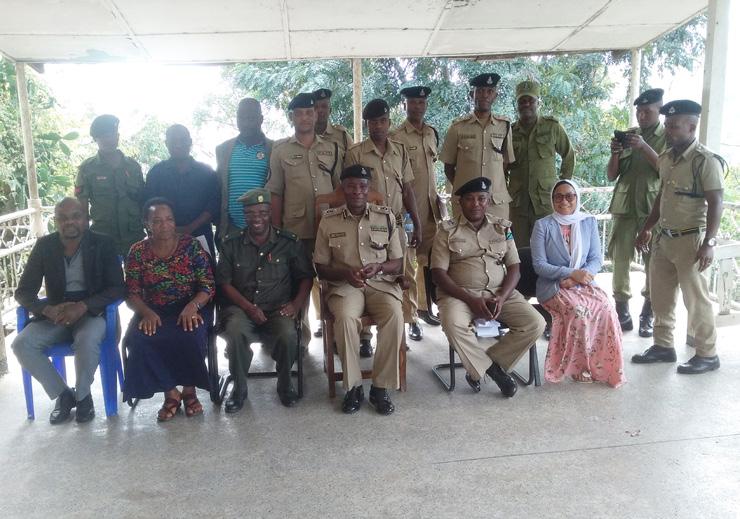
7 minute read
Beekeeping brings hope near Digya National Park
Kwame Aidoo, Giacomo Ciriello, and Isaac Mbroh
One problem that dampens the potential for beekeeping to lift people out of poverty across rural Africa is that training is often delivered in the context of micro aid projects. These projects target community groups whose headcount is limited by how much money there is in the budget to purchase hives. They do not cast their net wide enough to engage nearby people who already have an interest in, and knowledge of honey bees. They commonly have inadequate resources and expertise, do not reach areas that can support extensive beekeeping, and rarely generate enough produce and momentum to build the sustainable value chains that deliver strong livelihoods and unlock opportunities.
Yet the right people, in the right place, with the right knowledge and skills, can achieve great results – starting with as little as a bundle of green palm fronds. This is the story in Afram Plains in eastern Ghana.

Here Gideon, a master beekeeper trained by BfD Ghana, carries a Borassus palm hive to its siting place (Abomasarefu)

Grace Mensah hollowing out a Borassus palm trunk at the workshop in Nsogyaso
Here we share encouraging news from the latest workshops on hive making and harvesting from bees in March 2021.
Isaac Mbroh counted 202 people becoming involved. Some had come from as far as 30km away. Over the past two years, at least 586 new beekeepers across the district have been learning with Bees for Development (BfD) Ghana. They have woven or carved more than 1,000 beehives and many are already getting honey money - fixing their roof, and telling a friend. The word is spreading, and we have been asked to start our training courses in another nine locations.
The experience here tells us something about the choice ingredients for stirring up a beekeeping movement that revitalises communities which have been pushed to the margins.
Life at the margins of Digya National Park
There is a long history of conflict between authorities and local people accused of encroaching into the Park. BfD Ghana first came here in 2019 following reports of confrontations between Park rangers and honey hunters. Protecting what is in the Park, depends on supporting local people to make a good living, benefitting sustainably from natural resources.
Digya National Park was protected as a wildlife reserve in 1971 with the immediate purpose of stabilising Lake Volta and a long-term view to develop the area for tourism. The Park comprises many small islands in the lake and extends over 3,500km2 from its western shores into forests and savannah grasslands. It is a haven for biodiversity: over 300 species of birds, six species of primates plus elephants, gazelles, manatees, otters – and more still to discover. The only zoological survey conducted in the area during the early 1990s has been lost.
The Park has not seen tourists or biologists over the past 50 years partly because of the troubled history of nearby human settlement. Lake Volta is the largest artificial reservoir in the world. At least 80,000 people across 740 villages were displaced as the Volta basin flooded following the completion of the Akosombo Dam in 1965. A concerted but hurried effort was made to offer everyone a new home, developing the Afram Plains area.
Not suited for all
The settlements that were built did not suit everyone. People who depended on the river and surrounding forests had the hardest time adapting. Farmers were encouraged to embrace ‘modern’ high-input agriculture – which hardly ever lived up to its promises. Some families moved away from the dwellings assigned to them, and resettled closer to the lake, sometimes on the islands within it. The gazetting of the Digya National Park led to further forced evictions from the 1980s onwards, the latest of which were in 2006.
During the first workshops we ran in the settlements on the fringes of the Park, we listened to personal stories of people who had to leave their homes and the difficulties they experienced people in accessing basic services and securing a living. Education, health services and commerce are concentrated in Donkorkrom. Markets for export commodities are fickle, and land converted to plantations is no longer available for local people to grow food. Young men leave the area to work as labourers elsewhere, but have returned after losing their jobs due to Covid-19. Cash is lacking, and people are ready to earn some in a way that is legal and wholesome – and which does not require cash input.
We cannot say that people are just in it for the money. Those attending our Workshops know the value of honey and have seen many colonies of wild bees during their childhood.
Know how, bee hopeful
Honey hunters are often the best beekeeping trainees – they already know where the bees nest, on what plants they forage, and are very adept at making hives and tools out of natural materials available locally. They are not afraid of being stung and never have trouble selling honey – unless they get trouble from officers who suspect they obtained it illegally. People who already have experience with bees become independent beekeepers faster, and are more likely to mentor and help others who are starting out.

Kwame and Gideon, suited and booted, talk through their beekeeping work

Harvesting from a Borassus palm hive
Where there is an abundance of thriving bees, beekeeping can be as simple as providing safe nesting sites for them to move into, and harvesting honeycomb some months later. There is no need for regular inspections, feeding or treating. Kwame, Isaac and Gideon – the BfD Ghana team delivering the training sessions – focus at first on teaching people how to make fixed comb hives. Borassus palm is plentiful and hollowed sections of the trunk make very robust and thermally insulated cavities for bees to nest inside. Green palm fronds can also be used to weave cylindrical hives. Palm fibre makes excellent smoker fuel. If people master the skills needed to build their own hives, it is in their own hands to set up new apiaries and scale up their beekeeping. We provide only basic equipment to allow for safe and clean harvesting.
Buckets of honey
Beyond hive making, learning about honey bee biology and nutrition is important to catch swarms and schedule harvests, and harvesting safely is also a key aspect for training. We must keep our word that there will be someone to buy the buckets of honeycomb stacking up. We are focusing on setting up bulking and processing facilities and building relationships with buyers. As we do, further training will be needed to ensure beekeepers have all the information they need to meet food safety and quality standards. Meanwhile we are gearing up to pilot an innovative, low-cost traceability system which will allow us to target our efforts and ensure consistent, efficient and sustainable supply chains.
There is a lot of work to do, and we are fortunate that many people are rallying to help. Stella Adenyo already runs a successful business, trading organic natural products. She will rent us a place to function as a collection and sales centre in Donkorkrom. We are developing the traceability system with help from Max Rünzel, an expert in technological solutions for integrating smallholders in agricultural value chains. We know from experience that the single most important thing we must do to sustain the momentum and people’s enthusiasm is to ensure that there are people ready to buy honey. We also know from experience that it will take several iterations and more training workshops, over at least two years, before we can say supply chains are fully established and sustainable.
Forest guardians
We are working so that Park rangers can join in helping people to start beekeeping, offering them alternatives to illegal livelihood activities. We have signed an agreement with the Wildlife Division of the Forestry Commission, who have seconded wildlife officials to train with our staff, recognising the big contribution that beekeeping can make to conservation efforts. Beekeepers are forest guardians - they protect their bees from bushfires, and nurture trees that offer bees forage and habitat. Beekeepers are wealthier and healthier farmers – optimal pollination results in more and better crops and keeping bees incentivises organic, biodiversity-friendly practices. As this becomes recognised, people selling honey at Donkorkrom market are no longer being harassed under the assumption they hunted it illegally in the Park. This fills us with hope that this emerging beekeeping movement will help to mend relations between Park authorities and communities, securing a future where bees, trees and people’s chances in life grow together.








